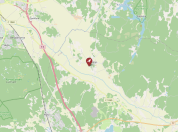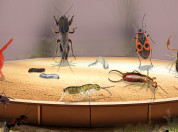Search
Filter by
Type
Tags
Dossiers
Themes
Departments
Active filters
1048 search results
Search results
-
Uppsala
Metadata of the field study (UPP-1) at Uppsala (UPP), Sweden
-
Greater Manchester
Metadata of the field study (GTM-1) at Greater Manchester (GTM), United Kingdom
-
PhD thesis defence Dieke Boezen: the genome plasticity of plant viruses
On Wednesday 25 October 2023, Dieke Boezen will defend her PhD thesis titled "The ecology of multipartite plant viruses: insight into genome plasticity from experimental investigation and metagenomics".n.
-
PhD thesis defence Nandini Raman: pharmaceutical disruption of aquatic ecosystems
On Friday 27 October 2023, Nandini Raman will defend her PhD thesis titled "The Hidden Impact: Exploring Sublethal Effects of Pharmaceutical Disruption on Aquatic Ecosystem Functioning".
-
Gabriel Silvestre Rocha
PhD Candidate
-
Soil animal days
Every year around World Animal Day, we go on safari in our own gardens looking for the important but often overlooked soil animals. This year marks the 11th edition of the Soil Animal Days. The annual event organised by a growing number of partners, is now welcoming observations all year round and also from countries outside the Netherlands!
-
PhD thesis defence Paola Rallo: Interactions between grasses and soil biota
On Monday 25 September, Paola Rallo will defend her PhD thesis, titled "Interactions between grasses and soil biota: From genes to climate-induced drought".
-
Book presentation on Water farming
On Friday afternoon 29 September, a new book about Water farming will be presented at NIOO. NIOO scientists Ellen Weerman and Ellen van Donk are two of the editors, and you are very welcome to join. The presentation will be in Dutch.
-
Symposium Migratory birds under pressure
On Thursday 7 September 2023 our Animal Ecology department is organising a symposium on migratory birds under pressure, followed by the PhD thesis defence of Kees Schreven the next day.
-
PhD Thesis defence Kees Schreven: range expansion in Arctic-breeding geese
On Friday 8 September 2023, our colleague Kees Schreven will defend his PhD thesis "Geese colonising New Land: causes and mechanisms of range expansion in an Arctic-breeding migrant".
